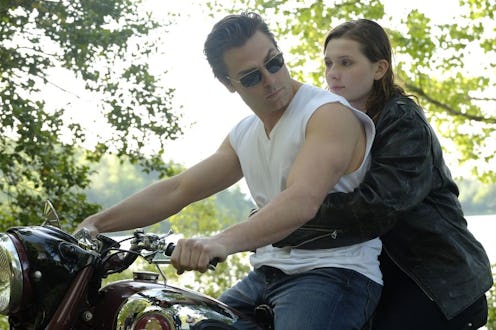Entertainment
Hoo Boy, That 'Dirty Dancing' Epilogue Was A Bold Choice

The Dirty Dancing remake takes most of its cues from the iconic scenes and characters that made the original so famous. However, the remake, which aired on ABC on May 24, includes a new epilogue that alters the original narrative. The addition contributes to making the musical feel long, old-fashioned, and misguided. The flash-forward ending of Dirty Dancing does away with some of the nostalgia and power of the 1987 movie.
After the big dance finale, the ABC special shifts into a five-minute epilogue. Baby, now in 1975, is watching a live musical version of Dirty Dancing. Later, she is alone in the theater and the musical's choreography, Johnny Castle, approaches her. It is mentioned that Baby has written a book about her summer experience and Johnny, finally making it to Broadway, has adapted it for the stage. All hope of the two rekindling that magical summer falls away, as it is revealed that Baby is married with a child.
This epilogue is extremely awkward within the context of the narrative. The Dirty Dancing remake sticks very close to the original formula, with the exception of adding a time jump. This decision is problematic as it raises the question as to why it the ending was included in the first place, when larger issues of socioeconomic class struggles, early marks of feminism, and changing race relations of the '60s are all very prominent pieces of the characters' journeys, yet remain unexplored.
Unfortunately, the Dirty Dancing remake never addresses any of these issues in a satisfying way. The film didn't really either. However, what worked in 1987 doesn’t work in 2017, a world where the audience needs an expansion of important social themes, not a nostalgic epilogue.
Understandably, Dirty Dancing’s main narrative focuses on Baby and her transition from her childhood identity to claiming her real name, Frances. However, by continuing to infantilize Baby’s personality, the musical places Baby and other characters into very rigid positions. Her older sister Lisa is ultra-feminine with only marriage aspirations, until Robbie tries to force himself on her on the beach. Lisa's attempts to convince her family that Robbie is a terrible person are ignored. If developed properly, her friendship with black Kellerman's musician Marco could have been an important statement.
Meanwhile Neil, the "good guy" who is used to explain The Feminine Mystique to Baby, acts out when Baby rejects him. Neil's presence juxtaposes well with Johnny as a working class dancer, who feels he doesn't have a place in the world because of his lack of education. However, the remake chooses to gloss over the issues of privilege in favor of more musical numbers. Naturally, this begs the question: why introduce these elements at all in the Dirty Dancing remake?
In Variety’s article comparing the original and the remake, Sonia Saraiya wrote, "The film, starring Jennifer Grey and Patrick Swayze, more or less stages a meet-cute around a botched abortion, and it doesn’t stop there; set at an idyllic Jewish resort in the Catskills, the film grapples with class, coming-of-age and feminism as much as it grapples with sweaty thighs and tight spandex.”
However, the remake doesn’t quite get there. While Baby is a Feminine Mystique reading, studious, wannabe doctor who wants to learn new skills, she doesn’t get to become Frances. Instead, the epilogue turns her into a woman romanticizing this one moment of her life. She sits alone in the theater, wiping her eyes at the precious memory of that summer she fell in love. Despite trying to add another layer to Baby and Johnny, the ending of this take on the story changes the legacy of Dirty Dancing.
Dirty Dancing's narrative is about one particular summer, so it makes sense that Baby and Johnny go their separate ways, having learned something new about themselves from each other. However, the epilogue makes their summer love more permanent, and causing the nostalgia that prompted so many fans to watch the Dirty Dancing remake in the first place, to miss a step.